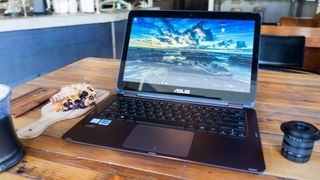Asus ZenBook Flip UX360 review
With laptops racing to see who can be the thinnest and lightest, compromises must be made. The
Apple MacBook ranks as one of the thinnest and lightest ultraportables on the market, but you’ll have to carry a bag full of dongles as it only features a single USB-C port. PC makers have done a better job of retaining ports like the
Dell XPS 13, which features 2 USB 3.0 ports, a USB-C port, and a SD card reader.
Apple MacBook ranks as one of the thinnest and lightest ultraportables on the market, but you’ll have to carry a bag full of dongles as it only features a single USB-C port. PC makers have done a better job of retaining ports like the
Dell XPS 13, which features 2 USB 3.0 ports, a USB-C port, and a SD card reader.
One of the best ultraportable laptops we’ve seen for the last two years has been the
Asus ZenBook UX305. It features a full array of ports, stunningly thin design, an excellent keyboard and trackpad and won TechRadar’s coveted Editor’s Choice award twice. Best of all, with a starting price of $699 (£599, AU$1,199), the UX305 isn’t going to break the bank.
Asus ZenBook UX305. It features a full array of ports, stunningly thin design, an excellent keyboard and trackpad and won TechRadar’s coveted Editor’s Choice award twice. Best of all, with a starting price of $699 (£599, AU$1,199), the UX305 isn’t going to break the bank.
Asus hopes to replicate its success with the ZenBook Flip UX360, which is a convertible version of the venerable UX305. Can Asus replicate its success with its thin-and-light convertible? Let’s find out.

SPEC SHEET
CPU: 900MHz Core M3-6Y30 (dual-core, 4MB cache, 2.2GHz with Turbo Boost)
Graphics: Intel HD Graphics 515RAM: 8GB DDR3L (1,866MHz SDRAM)
Screen: 13.3-inch, 1,920 x 1,080 IPS touch screen display
Storage: 512GB SSD (SATA3 M.2)
Ports: 2 x USB 3.0, USB-C Gen 1, micro HDMI, micro SDXC card reader, headphone jack
Connectivity: Integrated 802.11ac (2x2)
Camera: 1.2MP HD web camera
Weight: 2.86 lbs (1.29 kg)
Size: 12.71 x 8.66 x 0.54 inch (32.28 x 21.99 x 1.37 cm; W x D x H)
Design
While some may have criticized the ZenBook UX305 for looking too much like Apple’s
MacBook Air, the ZenBook Flip UX360 offers just enough of a visual differentiation that it looks unique.
MacBook Air, the ZenBook Flip UX360 offers just enough of a visual differentiation that it looks unique.
The UX360 still features the same all-aluminum chassis of its UX305 brother. It’s still stunningly thin, with the bottom portion being just a hair thicker than the two USB-A ports it houses. Thinnest results in the UX360’s featherweight 2.86 lbs (1.29 kg). That’s fractionally heavier than the 2.6 lb (1.17 kg) weight of the UX305.
The ZenBook Flip offers a striking design that’s subtle but managed to stand out from the crowd. Its spun metal lid features a brushed sunburst effect that looks spectacular in sunlight.
Conversely though, its glossy 13.3-inch Full HD screen leaves a lot to be desired when working outdoors. It’s definitely a step down from the matte screen of the UX305.

But with a laptop as thin as the UX360, there’s worry about structural rigidity. Unfortunately, the UX360 does flex a bit, especially around the keyboard area. This results in a somewhat squishy typing experience, but it’s not too bad. The UX360’s screen also exhibits a bit of flex, but its aluminum frame does an admirable job of making the chassis feel solid even with some springy play.

In terms of portability, the ZenBook Flip is thin but also larger than near-bezelless ultrabooks like the
Dell XPS 13. However, this means there’s plenty of room for a large keyboard and trackpad.
Dell XPS 13. However, this means there’s plenty of room for a large keyboard and trackpad.
While the keyboard isn’t backlit, we had very few complaints about the typing experience. There’s a good amount of key travel and feedback, so writers should be happy with the keyboard.

The layout of the keyboard is also spacious and follows the norm, with full-sized Backspace, Alt, Ctrl, and shift keys on both sides. However, we found that the left Alt key stuck on our review sample, which could just be an anomaly.
The trackpad is equally as spacious and features just the right amount of friction. It was a pleasure using
Windows 10’s gestures for multitasking and accessing the Notification Center. Clicks provide a nice tactile and audible feedback, and the pointing device drivers offer great response and accuracy.
Windows 10’s gestures for multitasking and accessing the Notification Center. Clicks provide a nice tactile and audible feedback, and the pointing device drivers offer great response and accuracy.

Thin but full featured
With thin and light laptops, there are usually compromises in terms of port selection. Asus has done a commendable job keeping all the ports we’re used to seeing on larger laptops. The UX360 features two USB 3.0 ports, a USB-C port, mini HDMI, 3.5mm headphone jack and even a full-sized SD card reader.
One area where Asus did have to compromise is the speaker location. When used as a laptop, the speakers fire from the laptop’s underside. This means sound can be muffled easily if you’re typing with the laptop on your lap. In convertible mode, the speakers avoid being muffled since they’re at the edges of the bottom of the laptop.
The speakers get sufficiently loud, but become distorted at high volumes. There’s also a noticeable lack of bass, so you’re better off using headphones. This is expected from having to squeeze speakers in such a thin chassis.






0 comments :
Post a Comment